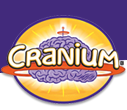|
Cranium, Inc.
Cranium, Inc. was a toy and board game developer. The company was founded in 1998 by two former Microsoft executives, Richard Tait and Whit Alexander. They co-developed the Cranium board game. HistoryAfter realizing that he always won at the game Pictionary, but lost more than frequently at the game Scrabble, Tait decided to make a game where everyone could win at something.[1] Drawing inspiration from the HBDI thinking styles assessment they completed at Microsoft, Tait and Alexander aimed to create a "Whole Brain" game. Taking certain aspects of other favorite games, Cranium requires players to spell, draw, mold clay, and answer trivia questions. Tait and Alexander created "a board-game where everyone has heroic moments".[2] Cranium, Inc. tested and modified their new game over and over. They knew they had a hit game on their hands when one day the game testers tried to steal the game.[3] Without having a retail outlet to sell their game, Cranium, Inc. ordered 20,000 units to be manufactured in China. Cranium, Inc. did have big name investors, such as Starbucks, where they were able to raise US$35 million.[2] Cranium, Inc. went on to win over 130 awards and sell over 22 million games and toys.[2] The company was bought out by Hasbro on January 4, 2008 for $77.5 million.[4] Marketing and advertisingCranium, Inc. marketing strategies were considered unorthodox by traditional game marketing standards.[5] Because Cranium came out after Christmas, and Cranium, Inc. did not want to compete in the traditional game buying market of toy stores, they decided to sell their game where their target audience would be. The target audience for Cranium was "25-35 year old, dating yuppies who wanted to connect to each other." Cranium, Inc. partnered with its investor, Starbucks, and sold the game at over 1500 Starbucks locations.[6] Cranium, Inc. then partnered with Barnes & Noble to have their games sold at their locations. Cranium became the first game sold at the bookstore chain. Cranium, Inc. also created a membership called "Club Cranium" that one could sign up for using codes included in marketing brochures included in their games; the club was later discontinued after the acquisition by Hasbro. In 1998, Cranium, Inc. had only spent $15,000, a relatively low figure, on marketing and advertising.[5] While most other games advertised on TV, Cranium, Inc. advertised Cranium on the radio.[6] Radio jocks would ask its listeners Cranium's trivia questions and winners got the game for free. Also, Cranium, Inc. made partnerships where Cranium questions were featured on Delta Song Airlines napkins, Dr. Pepper bottles at KFC, and on packages of Land O' Lakes butter.[6] Bill Furlong, Cranium, Inc.'s Director of Marketing had said that the game company "was giving people a chance to try their game everywhere from the grocery store, to 30,000 feet in the air on Delta Song Airplane".[3] Cranium, Inc. also found advertisement in celebrity endorsements. On The Oprah Winfrey Show, Julia Roberts stated that Cranium "was the most fun game ever" and that she and boyfriend Benjamin Bratt "could not stop playing it.[3] Al Gore and Bill Gates, Tait and Alexander's former boss, even endorsed the game. CraniumCranium is a party board game based on Ludo. It is billed as "The Game for Your Whole Brain." Unlike many other party games, Cranium includes a wide variety of activities. Giorgio Davanzo created the packaging and brand identity for the game, and Gary Baseman, co-creator of the animated series Teacher's Pet, did the art. Spin-offsCranium Cadoo, a spin-off designed for school-aged kids (7 and up), won the "Game of the Year" award for 2002 from the Toy Industry Association.[7] Cranium Hullabaloo, a spin-off of the game aimed at young children (4 and up), won the "Game of the Year" award for 2003 from the Toy Industry Association.[8] Toys and games
AwardsCranium was named "Game of the Year" for 2001 by the Toy Industry Association.[10] References
External links |
||||||||||||||||||||

